|
|
|
Sort Order |
|
|
|
Items / Page
|
|
|
|
|
|
|
| Srl | Item |
| 1 |
ID:
138956
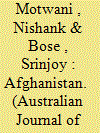

|
|
|
|
|
| Summary/Abstract |
The ongoing international military withdrawal from Afghanistan has set the stage for energising the activities of Afghanistan’s external stakeholders to re-evaluate their activities. The possible return of the Taliban in some form could compel Afghanistan’s current external partners—Iran, India and Russia—to turn into limited spoilers. The absence of an international guarantor in Afghanistan from December 2014 is likely to encourage Pakistan—a greedy spoiler—to intensify its meddling as a means to reposition the Taliban—a total spoiler—at the helm of Afghan affairs. The combination of limited, greedy and total spoilers threatens to undermine security and state-building processes.
|
|
|
|
|
|
|
|
|
|
|
|
|
|
|
|
| 2 |
ID:
106036


|
|
|
|
|
| Publication |
2011.
|
| Summary/Abstract |
The fate of missing persons is a central issue in post-conflict societies facing truth recovery and human rights dilemmas. Despite widespread public sympathy towards relatives, societies emerging from conflict often defer the recovery of missing for decades. More paradoxically, in post-1974 Cyprus, the official authorities delayed unilateral exhumations of victims buried within cemeteries in their own jurisdiction. Analysis of official post-1974 discourses reveals a Greek-Cypriot consensus to emphasise the issue as one of Turkish aggression, thus downplaying in-group responsibilities and the legacy of intra-communal violence. We compare the experience of Cyprus with other post-conflict societies such as Spain, Northern Ireland, and Mozambique and explore the linkages between institutions and beliefs about transitional justice. We argue that elite consensus initiates and facilitates the transition to democracy but often leads to the institutionalisation of groups opposing truth recovery even for in-group members.
|
|
|
|
|
|
|
|
|
|
|
|
|
|
|
|
| 3 |
ID:
183953
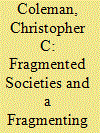

|
|
|
|
|
| Summary/Abstract |
The cases of peacemaking in Kosovo and Sudan/South Sudan yield insights into the interplay of international politics, relations among political elites, and reconciliation among identity groups. A durable, positive peace requires an approach by peacemakers that encompasses all these dimensions. Complicating matters, the readiness of states to adhere to rules and norms built up over decades has declined in recent years. Absent a concerted effort to (re)build them, the work of peace mediation will become more challenging and the odds of success incalculably longer. This, in turn, will corrode the ability of external powers, competing via proxy, to work together even on unrelated matters in different parts of the globe.
|
|
|
|
|
|
|
|
|
|
|
|
|
|
|
|
| 4 |
ID:
180626
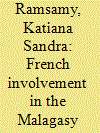

|
|
|
|
|
| Summary/Abstract |
In March 2009, President Marc Ravalomanana of the Island of Madagascar was ousted during a coup d’état led by the Mayor of Antananarivo, Andry Rajoelina, and his supporters. After the coup, Ravalomanana and his family fled to South Africa where they remained in exile from 2009 to 2014. To restore constitutional order in Madagascar, the Southern African Development Community (SADC), in July 2009, took the lead in a mediation process involving all Malagasy and other key stakeholders. SADC’s mediation efforts, led by former President Chissano, formally ended in 2013 with the holding of democratic elections. The mediation effort, which lasted five years, was conducted in a very competitive and ‘crowded’ field. The ‘crowded’ field was characterised by in-fighting amongst the various international bodies for power and influence including ‘spoiler’ tactics used by vested interests to hinder the mediation process and prevent the return of Ravalomanana to Madagascar. This article looks specifically at the ‘spoiler’ role that France played during the mediation process to safeguard her interests in Madagascar under the Sarkozy Administration. France is known to intervene in the political and economic affairs of her former colonies and, during the 2009 coup, this was no exception.
|
|
|
|
|
|
|
|
|
|
|
|
|
|
|
|
| 5 |
ID:
180887


|
|
|
|
|
| Summary/Abstract |
Completed negotiations often end in shortfalls, half glasses, and way stations. Is that enough to claim success and is a half-loaf sometimes sufficient? The nine articles in this thematic issue examine various forms of incomplete negotiations, from a full-worded agreement that is bypassed, through a formal ceasefire, an agreement among only the agreeables, a mediated but non-transforming agreement, a confidence-building agreement, and finally, claimed resolution that drives violence underground. Sufficiency has different meanings in each case, but generally refers to making some progress in handling the conflict, whereas insufficiency refers to not making progress at any level that is lasting.
|
|
|
|
|
|
|
|
|
|
|
|
|
|
|
|
| 6 |
ID:
110762
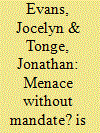

|
|
|
|
|
| Publication |
2012.
|
| Summary/Abstract |
Dissident Irish Republicans have increased their violent activities in recent years. These "spoilers" reject the 1998 Good Friday Agreement power-sharing deal between Unionist and Nationalist traditions in Northern Ireland. Instead dissident IRAs vow to maintain an armed campaign against Britain's sovereign claim to Northern Ireland and have killed British soldiers, police officers, and civilians in recent years. These groups have small political organisations with which they are associated. The assumption across the political spectrum is that, whereas Sinn Fein enjoyed significant electoral backing when linked to the now vanished Provisional IRA, contemporary violent Republican ultras and their political associates are utterly bereft of sympathy. Drawing upon new data from the Economic and Social Research Council 2010 Northern Ireland election survey, the first academic study to ask the electorate its views of dissident Republicans, this article examines whether there are any clusters of sympathy for these irreconcilables and their modus operandi. The piece assesses whether there are any demographic, structural, ideological, religious, or party trends indicating Republican dissident sympathies. It also assesses the extent to which dissidents are seen as a threat and examines whether this perception is shared evenly across Northern Ireland's two main communities.
|
|
|
|
|
|
|
|
|
|
|
|
|
|
|
|
| 7 |
ID:
159904


|
|
|
|
|
| Summary/Abstract |
More than a decade on, the Northern Ireland peace process can largely be considered a success. Despite the failure of the Provisional Republican Movement to achieve a united Ireland free of British control, the large-scale violence of “The Troubles” has been relegated to the past. Applying the logic of coercive diplomacy, this study examines the role of threats and the use of selective and limited violence by the Provisional Movement to manage real and potential opponents and challengers that have emerged within its own ideological ranks to maintain its position of dominance and prevent a spoiling of the peace process. This study shows that the Provisional Movement retained the capability to employ violence and demonstrated the credibility of coercive threat through a willingness to use force against its opponents on the Republican spectrum, and was able to do so with a high degree of impunity.
|
|
|
|
|
|
|
|
|
|
|
|
|
|
|
|
| 8 |
ID:
163705
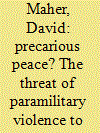

|
|
|
|
|
| Summary/Abstract |
This article provides an investigation into claims that paramilitary violence in Colombia can pose a threat to the peace agreement signed in 2016 between the Colombian government and the FARC rebels. These claims highlight the capacity for paramilitary groups to ‘spoil’ the peace deal. Hitherto, however, there is a lack of scholarly research to investigate the potential of paramilitary spoiling. Firstly, this article highlights the flaws in the government’s perspective that paramilitarism no longer exists in Colombia. Instead, the government argues that Colombia is plagued by criminal bands (known as BACRIMs). Secondly, through fieldwork interviews and questionnaires conducted in FARC demobilisation camps, together with descriptive data analysed through a uniquely coded dataset on violence in western Colombia, this article supports claims that successor paramilitary groups represent a key spoiler threat to the current government-FARC peace process. On the one hand, the paramilitaries can represent a direct spoiler threat by, for instance, violently targeting demobilising FARC guerrillas. On the other hand, successor paramilitary groups represent a key indirect spoiler threat, as paramilitary violence is exacerbating the root causes of the conflict that the peace deal seeks to address, with negative implications for the prospects for peace.
|
|
|
|
|
|
|
|
|
|
|
|
|
|
|
|
| 9 |
ID:
165452
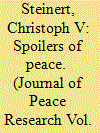

|
|
|
|
|
| Summary/Abstract |
This study investigates how deployment of pro-government militias (PGMs) as counterinsurgents affects the risk of conflict recurrence. Militiamen derive material and non-material benefits from fighting in armed conflicts. Since these will likely have diminished after the conflict’s termination, militiamen develop a strong incentive to spoil post-conflict peace. Members of pro-government militias are particularly disadvantaged in post-conflict contexts compared to their role in the government’s counterinsurgency campaign. First, PGMs are usually not present in peace negotiations between rebels and governments. This reduces their commitment to peace agreements. Second, disarmament and reintegration programs tend to exclude PGMs, which lowers their expected and real benefits from peace. Third, PGMs might lose their advantage of pursuing personal interests while being protected by the government, as they become less essential during peacetimes. To empirically test whether conflicts with PGMs as counterinsurgents are more likely to break out again, we identify PGM counterinsurgent activities in conflict episodes between 1981 and 2007. We code whether the same PGM was active in a subsequent conflict between the same actors. Controlling for conflict types, which is associated with both the likelihood of deploying PGMs and the risk of conflict recurrence, we investigate our claims with propensity score matching, statistical simulation, and logistic regression models. The results support our expectation that conflicts in which pro-government militias were used as counterinsurgents are more likely to recur. Our study contributes to an improved understanding of the long-term consequences of employing PGMs as counterinsurgents and highlights the importance of considering non-state actors when crafting peace and evaluating the risk of renewed violence.
|
|
|
|
|
|
|
|
|
|
|
|
|
|
|
|
| 10 |
ID:
096200
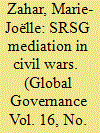

|
|
|
|
|
| Publication |
2010.
|
| Summary/Abstract |
In transitions from war to peace, mediators and other foreign interveners identify "spoilers" as one of the main threats to peace processes. Profiling would-be spoilers and developing appropriate typologies to prevent them from using violence has become prevailing wisdom at the United Nations and beyond. This article argues that the spoiler typology has limited utility as a tool to guide the action of mediators and help them devise winning strategies. It asserts that there are no fixed spoiler types; actors' propensity to use violence depends on conditions that affect their capability and their opportunity structure. It uses the twin notions of capability and opportunity to identify ripe situations for mediation and for peace implementation. It also utilizes these notions to reflect on the appropriateness of various strategies that the international community can use in its attempt to bring about peace to war-torn countries. The article suggests that it is not actors, but contexts, that need to be profiled. Furthermore, international custodians do not simply react to situations; they have a profound impact on shaping the opportunity structure of civil war actors, and their willingness to implement policies that increase the cost of violence goes a long way toward determining whether or not local actors will use violence.
|
|
|
|
|
|
|
|
|
|
|
|
|
|
|
|
| 11 |
ID:
140871
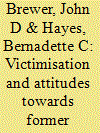

|
|
|
|
|
| Summary/Abstract |
The release of ex-combatants and the mechanisms for their re-integration within society has become an increasingly controversial issue in peace settlements. Yet to date, the view of victims concerning such arrangements in post-conflict societies remains unexplored. Mindful of this omission and using Northern Ireland as a case study, this article investigates the relationship between victimisation and attitudes towards the treatment of former political prisoners. Based on the 2011 Northern Ireland Social and Political Attitudes Survey, the results suggest that individual victims—those who directly and/or indirectly experienced violent incidents—are notably less supportive of a punitive approach towards the treatment of former political prisoners than non-victims. Moreover, this is particularly the case when victims from within the Catholic community are considered. The Northern Ireland evidence suggests that victims can act as a positive and inclusive force in terms of the rehabilitation and re-integration of former combatants in societies emerging from conflict.
|
|
|
|
|
|
|
|
|
|
|
|
|
|
|
|
| 12 |
ID:
105187
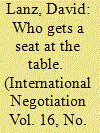

|
|
|
|
|
| Publication |
2011.
|
| Summary/Abstract |
Who gets a seat at the table and who does not is an important consideration for successful peacemaking. However, current research does not provide sufficient guidance for understanding the politics of participation in peace negotiations. This article develops a conceptual framework for understanding these dynamics. Its central theme is that the inclusion or exclusion of a given actor in peace negotiations is affected by two independent factors. One factor pertains to the practical requirements of the peace process and addresses the following question: does the participation of a given actor augment the chance of reaching a sustainable peace settlement? The other factor relates to the normative dimension of peace talks: is the participation of a given actor consistent with the values of international mediators and sponsors of peace negotiations? The article argues that the dynamics of inclusion and exclusion result from the interplay of these two factors. The most straightforward situation for mediators is when practical requirements and international norms are mutually reinforcing. Difficulties arise from scenarios where practical effectiveness and norms contradict each other. This is the case when the involvement of a given person (or group) is imperative in terms of the peace process, but difficult to justify politically because this person has committed terrorist acts or is indicted by an international court.
|
|
|
|
|
|
|
|
|
|
|
|
|
|
|
|
|
|
|
|
|